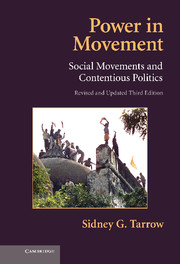Book contents
- Frontmatter
- Contents
- List of Figures
- List of Tables
- Preface
- Acknowledgments
- Introduction
- 1 Contentious Politics and Social Movements
- PART I THE BIRTH OF THE MODERN SOCIAL MOVEMENT
- PART II POWERS IN MOVEMENT
- PART III DYNAMICS OF CONTENTION
- 9 Mechanisms and Processes of Contention
- 10 Cycles of Contention
- 11 Struggling to Reform
- 12 Transnational Contention
- Conclusions: The Future of Social Movements
- Sources
- Index
- Titles in the series
11 - Struggling to Reform
Published online by Cambridge University Press: 05 June 2012
- Frontmatter
- Contents
- List of Figures
- List of Tables
- Preface
- Acknowledgments
- Introduction
- 1 Contentious Politics and Social Movements
- PART I THE BIRTH OF THE MODERN SOCIAL MOVEMENT
- PART II POWERS IN MOVEMENT
- PART III DYNAMICS OF CONTENTION
- 9 Mechanisms and Processes of Contention
- 10 Cycles of Contention
- 11 Struggling to Reform
- 12 Transnational Contention
- Conclusions: The Future of Social Movements
- Sources
- Index
- Titles in the series
Summary
“Struggling to reform”: What a strange term to use in introducing a discussion of the impacts of social movements! Movement activists demand fundamental social change, the recognition of new identities, entry into the polity, the destruction of their enemies, or the overthrow of a social order – but seldom just “reform.” Indeed when, as we saw in the last chapter, movements empower a general cycle of contention, claims become so broad and elites so besieged that profound changes are forced onto the agenda. Nevertheless, as I will argue in this chapter, few movements “succeed” in achieving their demands in anything like their original form. At best, they contribute to collective goods that benefit those they claim to represent; at worst, the structure of politics through which new claims are processed forces them into a common crucible from which reform is the best they can expect. The political process, this chapter will argue, is not only the context within which claims are made (Amenta 2006), but the mechanism through which claims are structured, narrowed, and often reversed (Lipsky and Olson 1976; Piven and Cloward 1977).
THE AMBIGUITY OF POLICY OUTCOMES
For many years, analysts of social movements have bewailed our lack of knowledge of their policy outcomes (Giugni 1998; Marx and Wood 1975). In the absence of convincing information on movement outcomes, a number of taxonomies have been produced – almost as many as there are studies of the subject.
- Type
- Chapter
- Information
- Power in MovementSocial Movements and Contentious Politics, pp. 215 - 233Publisher: Cambridge University PressPrint publication year: 2011
- 1
- Cited by



